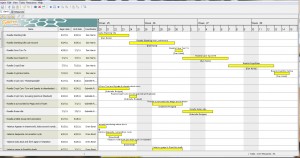Developer Diary: Managing an Online Team on a Shoestring Budget
by Katie Hallahan on Jan.31, 2012, under cognition, developer diary, featured, tsl
The next entry in our on-going developer diary series, originally posted here.
Happy New Year! Mayan prophecies be damned, I buying levitra online think 2012 is going to be a great year. (That’s the last time I’ll mention Mayans, unless they turn out to be right and I’m still around post-apocalypse.)
With Kickstarter and the holidays behind us, Phoenix Online has been busy working away at Cognition with all due haste. Our programmers are getting familiar with the Unity Engine and creating the tools and pipeline for the game, our artists are hard at work on concept art and cutscenes, our animators are working on creating the pieces of the game itself, and myself and Cesar are furiously plotting, writing, and editing the first two episodes.
It’s an interesting and different beast than working on The Silver Lining, but the lessons learned in our nine years of development for TSL are serving us well now. We spent that time figuring out just how to make a video game, a trial-and-error of methods that didn’t work and ones that did. We learned how to organize a company that has no office, no budget, and whose members don’t all share a common timezone. Can it be done? It’s not easy, but if you’ve got good people who are dedicated, you can make it work. And while our Kickstarter funds are a lowest priced propecia huge help in making this game happen, we still need to keep a close eye on our spending. So we don’t overlook the number of programs available either for free or inexpensively that we found and used during TSL’s development.
Advances in communication technology have helped us immensely along the way. We started off on yahoogroups and MSN chat, but today we’ve got our own email system and servers, and Skype has been a great improvement over MSN. The ability to turn those typing chat sessions into free phone calls cuts down on time that was often wasted in trying to explain ourselves—an hour of typing is now a 15 minute conversation! Programs that allow you to share your screens remotely have been a great help as well—most recently we’ve been using Mikogo for this, another product that is free to use. And finally, we’ve run recent live events over Ustream, and plan to use it again when we do our backers-only stream of the demo.
On the production end, our file sharing has been greatly helped by Tortoise SVN and Dropbox. Once we were starting to put together the engine, using the shared files on yahoogroups just wasn’t an option anymore. That’s when we moved to setting an FTP and using SVN to make sure everyone had the most updated builds—it’s simple to install and easy to both update and regress to an earlier version if you need to recover lost files. Dropbox has been an excellent add-on to that as we started stretching our server space with the SVN buy cheapest viagra online builds. Though it’s more limited in how much space you have to work with, we could keep smaller projects there and save room on SVN, and it’s similarly easy to update so that everyone is working with the most current files. Then there’s Redmine, an online database that’s excellent for tracking assignments, bugs, and what’s been completed, what hasn’t, who it’s assigned to and so forth; and finally, Gannt, a project management tool that our coordinators swear by for tracking and scheduling.
In the end, utilizing tools and programs that are free-to-use has saved us a lot of time as well as money, by helping us organize and streamline our projects. Even now, as a fledgling commercial company, we’re working on a tight budget and every little bit counts. If you’re going to get creative and make a video game for free, be ready to get creative with how you make that feasible for your team.

